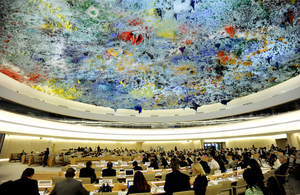UN Human Rights Council 41: discrimination against women and business and human rights
The UK called for members to prioritise women's economic empowerment and highlighted the UK's commitment to achieving Sustainable Development Goal 5.

UN HRC
Thank you, Mr President,
The United Kingdom thanks the Working Group on Discrimination against Women for their report on “Women deprived of liberty”.
Turning to the Working Group on Business and Human Rights, we welcome their considerable work to provide guidance on a range of issues to promote implementation of the UN Guiding Principles on Business and Human Rights.
The UK welcomes the Report of the Working Group on “Gender Dimensions for the Guiding Principles on Business and Human Rights”, which rightly highlights the differentiated and disproportionate impact of business activities on women and girls.
Women constitute the majority of victims of modern slavery, including forced and child labour, and domestic servitude. Through its work on combatting modern slavery in supply chains, the UK will continue to work with partners to reduce supply chain modern slavery and human rights risks.
Women’s economic empowerment is fundamental for the full realisation of human rights and for gender equality. It has positive impacts on economic growth, business performance and human development outcomes. The UK’s gender pay gap reporting regulations and forthcoming road map to gender equality and economic empowerment demonstrates our commitment to this agenda.
The UK will continue to play its part in promoting women’s empowerment and working to achieve the Sustainable Development Goal 5 “to achieve gender equality and empower all women and girls”.
Regarding the report, we agree it would be helpful to supplement the Gender Framework with specific guidance for high-risk sectors where women are disproportionately affected. Does the Working Group have any specific sectors in mind, should it decide to expand its guidance further?
Thank you.